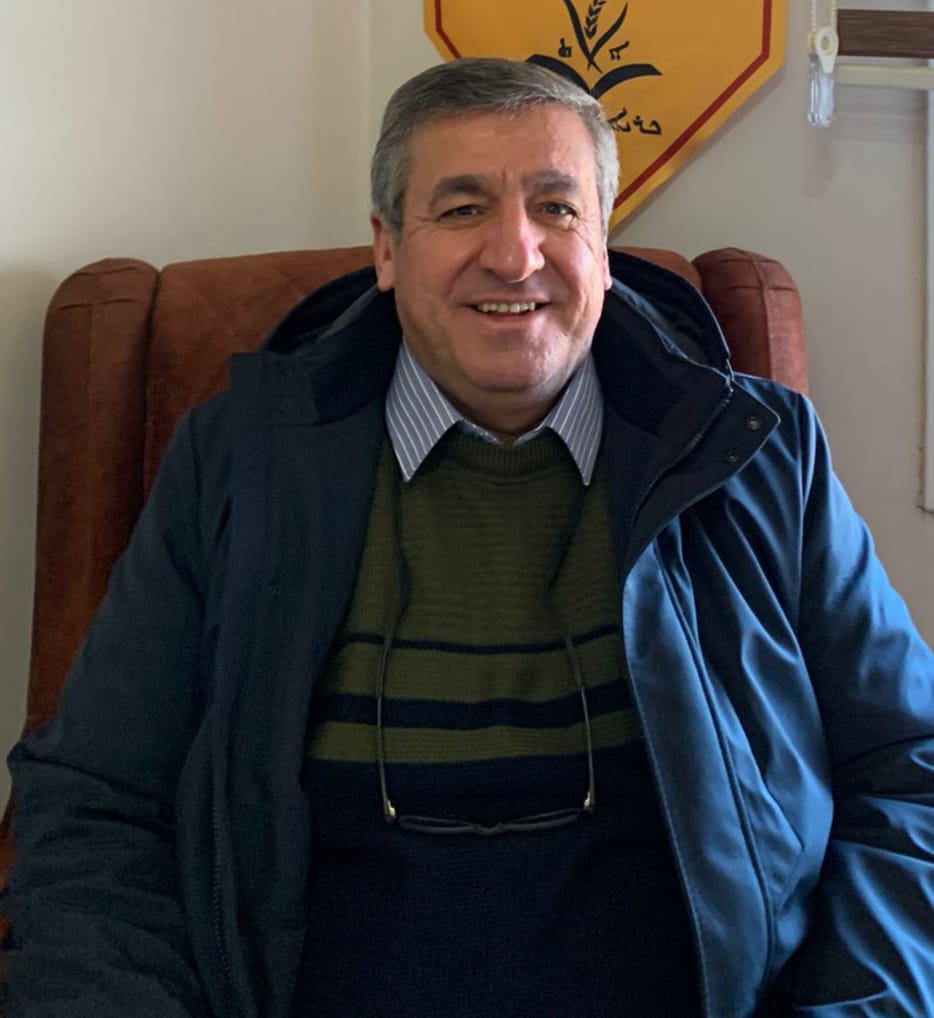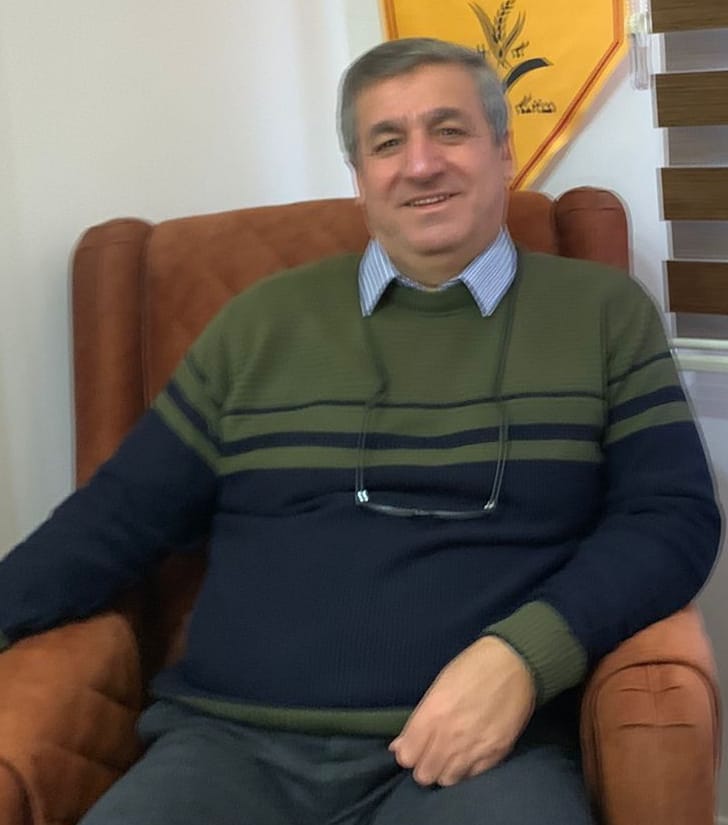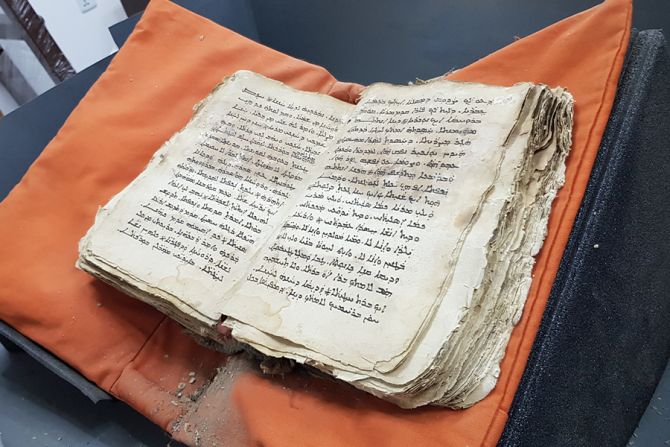ܥܰܠ ܗܳܝ ܕܡܳܢܳܐ ܘܳܠܶܐ ܠܒܰܪܢܳܫܳܐ ܠܡܶܕܰܥ ܘܰܠܡܺܐܠܰܦ
ܒܰܪܢܳܫܳܐ ܡܰܢ ܗܰܟܺܝܠ ܐܺܝܬܰܘܗܝ ܚܰܝܳܐ ܡܠܺܝܠܳܐ ܡܳܝܽܘܬ̥ܳܐ. ܕܰܡܪܰܟܰܒ ܡܶܢ ܢܰܦܫܳܐ ܚܰܝܬܳܐ ܘܰܡܠܺܝܠܬܳܐ ܕܒܰܟܝܳܢܳܗ̇ ܫܰܦܝܳܐ ܘܢܰܗܺܝܪܳܐ. ܘܥܰܠ ܗܳܝ ܐܺܝܬܶܝܗ̇ ܡܩܰܒܠܳܢܺܝܬܳܐ ܕܗܰܘܢܳܐ ܘܕܺܝܕܰܥܬܳܐ ܐܰܡܺܝܢܳܐܝܬ̥ ܘܰܕܠܳܐ ܣܳܟ̥ܐ. ܘܡܶܢ ܦܰܓܪܳܐ ܗܽܘܠܳܢܳܝܳܐ ܘܝܰܩܺܝܪܳܐ. ܕܰܡܩܰܝܰܡ ܡܶܢ ܐܰܪܒܥܳܐ ܐܶܣܛܽܘܟ̈ܣܶܐ. ܕܡܶܢܗܽܘܢ ܡܩܰܝܰܡ ܘܰܡܛܰܟܰܣ ܥܳܠܡܳܐ ܗܳܢܳܐ ܟܽܠܶܗ ܡܶܬܚܰܙܝܳܢܳܐ. ܘܡܶܛܽܠ ܕܠܳܐ ܐܺܝܬܰܘܗܝ ܐܰܝܟ ܚܰܝ̈ܘܳܬܳܐ ܐ̱ܚܪ̈ܳܢܝܳܬܳܐ ܕܠܳܐ ܡܶܠܬܳܐ. ܐܶܠܳܐ ܡܫܰܘܬܰܦ ܒܡܶܠܬܳܐ ܕܺܝܕܰܥܬܳܐ ܘܺܐܝܬ ܒܶܗ ܟܝܳܢܳܐ ܕܰܡܩܰܒܶܠ ܝܺܕܰܥܬܳܐ ܟܡܳܐ ܕܡܶܬܝܰܗܒܳܐ ܠܶܗ ܚܶܟܡܬܳܐ. ܘܰܡܨܶܐ ܣܳܠܶܩ ܘܡܶܬܥܰܠܶܐ ܒܺܝܕܰܥܬܶܗ ܘܗܰܘܢܶܗ ܥܕܰܡܳܐ ܠܪ̈ܰܘܡܶܐ ܠܳܐ ܡܶܬܡܰܫ̈ܚܳܢܶܐ ܘܠܳܐ ܡܶܣܬܰܝܟܳܢ̈ܶܐ. ܐܰܝܠܶܝܢ ܕܠܰܘ ܡܶܢ ܟܬܳܒܳܐ. ܘܠܳܐ ܡܶܢ ܫܶܡܥܳܐ ܝܳܠܶܦ ܘܝܳܕܰܥ ܠܗܶܝܢ. ܐܶܠܳܐ ܡܶܢ ܛܶܟܣܳܐ ܫܒܺܝܚܳܐ ܕܕܽܘܒܳܪ̈ܶܐ ܡܝܰܬܪ̈ܶܐ ܕܰܡܚܰܘܶܐ ܒܰܩܢܽܘܡܶܗ. ܙܳܕܶܩ ܠܶܗ ܕܢܶܒܥܶܐ ܘܰܢܥܰܩܶܒ ܘܢܺܐܠܰܦ ܐܰܡܺܝܢܳܐܝܬ.
ܕܡܳܢܳܐ ܟܰܝ ܐܺܝܬܰܘܗܝ ܗܽܘ ܟܝܳܢܶܗ ܕܺܝܠܶܗ ܕܒܰܪ ܐ̱ܢܳܫܳܐ؟ ܘܰܠܡܳܢܳܐ ܐܺܝܬܰܘܗܝ؟ ܘܡܶܛܽܠ ܡܳܢܳܐ؟ ܘܡܶܛܽܠ ܕܛܶܟܣܳܐ ܐܺܝܬ ܠܟܽܠ ܡܶܕܶܡ. ܘܳܐܦ ܠܶܗ ܙܳܕܶܩ ܕܰܒܛܶܟܣܳܐ ܢܶܬܚܰܫܰܚ. ܘܢܶܕܰܥ ܕܡܳܢܳܐ ܘܳܠܶܐ ܠܶܗ ܩܰܕܡܳܐܝܬ̥ ܕܢܺܐܠܰܦ ܘܢܶܕܰܥ. ܘܡܶܢ ܐܰܝܟܳܐ ܢܫܰܪܶܐ ܒܝܽܘܠܦܳܢܳܐ ܕܺܝܕܰܥܬܶܗ ܕܰܫܪܳܪܳܐ. ܘܰܐܝ̇ܕܳܐ ܗ̱ܝ ܫܶܬܶܐܣܬܳܐ ܩܰܕܡܳܝܬܳܐ ܕܙܳܕܶܩ ܕܢܰܪܡܶܐ. ܘܕܰܐܝܟ ܐܰܝܠܶܝܢ ܒܶܢ̈ܝܳܢܶܐ ܐܺܝܬ ܠܶܗ ܕܢܶܒܢܶܐ ܥܠܶܝܗ̇. ܘܕܰܥܕܰܡܳܐ ܠܰܐܝܟܳܐ ܢܶܣܰܩ ܘܢܶܬܥܰܠܶܐ ܒܶܢܝܳܢܶܗ. ܘܰܕܡܶܢ ܐܰܝܟܳܐ ܢܫܰܪܶܐ ܒܽܐܘܪܚܳܐ ܗܳܕܶܐ ܕܺܝܕܰܥܬܳܐ ܕܰܫܪܳܪܳܐ. ܕܦܳܪܫܳܐ ܫܪܳܪܳܐ ܡܶܢ ܕܰܓܳܠܽܘܬܳܐ. ܘܢܽܘܗܪܳܐ ܡܶܢ ܚܶܫܽܘܟܳܐ. ܘܩܽܘܫܬܳܐ ܡܶܢ ܫܽܘܩܪܳܐ. ܘܺܝܕܰܥܬܳܐ ܡܶܢ ܛܳܥܝܽܘܬ̥ܳܐ.
ܡܶܛܽܠ ܕܟܽܠ ܕܰܡܗܰܠܶܟ ܒܢܽܘܗܪܳܐ ܠܳܐ ܛܳܥܶܐ ܘܠܳܐ ܡܶܬܬܘܰܗ. ܐܶܠܳܐ ܝܳܕܰܥ ܐܰܝܟܰܢܳܐ ܡܗܰܠܶܟ ܘܠܳܐܝܟܳܐ ܐܳܙܶܠ. ܘܡܳܛܶܐ ܠܰܐܝܟܳܐ ܕܨܳܒܶܐ. ܘܡܶܫܬܰܡܠܶܐ ܢܺܝܫܳܐ ܕܣܺܝܡ ܒܪܶܥܝܳܢܶܗ. ܡܩܰܒܶܠ ܣܽܘܟܳܝܶܗ ܘܗܳܘܶܐ ܠܶܗ ܫܽܘܠܳܡܳܐ ܛܳܒܳܐ ܠܣܽܘܥܪܳܢܶܗ. ܘܚܰܪܬܳܐ ܫܰܦܺܝܪܬܳܐ ܠܟܽܠܶܗ ܕܽܘܒܳܪܶܗ. ܡܰܢ ܕܶܝܢ ܕܪܳܕܶܐ ܒܚܶܫܽܘܟܳܐ ܠܳܐ ܝܳܕܰܥ ܐܰܝܟܰܢܳܐ ܡܗܰܠܶܟ. ܘܠܳܐ ܠܰܐܝܟܳܐ ܐܳܙܶܠ. ܘܠܳܐ ܢܳܣܒܳܐ ܫܽܘܠܳܡܳܐ ܛܳܒܳܐ ܡܰܪܕܺܝܬܶܗ. ܐܶܠܳܐ ܛܳܥܶܐ ܒܬܰܘܫܳܐ. ܘܠܰܐܒܕܳܢܳܐ ܫܳܪܟܳܐ ܚܰܪܬܶܗ.
ܗܳܟܰܢ ܐܺܝܬܶܝܗ̇ ܠܳܐ ܝܺܕܰܥܬܳܐ ܕܰܫܪܳܪܳܐ. ܘܗܳܠܶܝܢ ܦܽܘܪ̈ܫܳܢܶܐ ܐܺܝܬ ܒܰܝܢܳܬ̥ ܫܪܳܪܳܐ ܠܕܰܓܳܠܽܘܬܳܐ. ܘܒܶܝܬ ܛܳܒܬܐ ܠܒܺܝܫܬܳܐ. ܘܒܶܝܬ ܢܽܘܗܪܳܐ ܠܚܶܫܽܘܟܳܐ. ܡܶܛܽܠ ܕܰܫܪܳܪܳܐ ܘܛܳܒܬܳܐ ܢܽܘܗܪܳܐ ܐܺܝܬܰܝܗܽܘܢ. ܘܰܩܢܽܘ̈ܡܶܐ ܡܩܰܝ̈ܡܶܐ ܐܶܢܽܘܢ. ܘܺܐܝܬ ܠܗܽܘܢ ܫܽܘܪܳܝܳܐ ܐܰܘܟܺܝܬ ܪܺܝܫܺܝܬܳܐ. ܘܺܐܝܬܽܘܬܳܐ. ܕܰܓܳܠܽܘܬܳܐ ܕܶܝܢ ܘܒܺܝܫܬܳܐ ܘܚܶܫܽܘܟܳܐ ܠܰܝܬ ܐܶܢܽܘܢ. ܘܠܳܐ ܩܢܽܘܡ̈ܶܐ ܐܺܝܬ ܠܗܽܘܢ ܐܳܦܠܳܐ ܐܺܝܬܽܘܬܳܐ. ܐܶܠܐ ܓܠܺܝܙܽܘܬܐ ܕܡܶܢ ܡܶܕܶܡ ܐܺܝܬܰܝܗܽܘܢ. ܐܰܘܟܺܝܬ ܡܶܬܬܪܺܝܡܳܢܽܘܬܳܐ. ܐܰܝܟ ܗܳܝ ܕܢܺܐܡܰܪ ܐ̱ܢܳܫ܆ ܢܰܗܺܝܪ ܐܺܝܡܡܳܐ. ܗܳܕܶܐ ܐܺܝܬܶܝܗ̇ ܘܫܰܪܺܝܪܳܐ. ܘܶܐܢ ܢܺܐܡܰܪ ܕܠܳܐ ܢܰܗܺܝܪ ܐܺܝܡܳܡܳܐ. ܗܳܕܶܐ ܘܠܳܐ ܡܶܕܶܡ ܐܺܝܬܶܝܗ̇. ܘܠܳܐ ܫܰܪܺܝܪܳܐ. ܒܠܺܠܝܳܐ ܕܶܝܢ ܕܡܶܬܓܠܶܙ ܥܳܠܡܳܐ ܡܶܢ ܫܶܡܫܳܐ ܘܡܶܬܬܪܺܝܡܺܝܢ ܙܰܠܺܝ̈ܩܰܘܗܝ ܡܶܢ ܐܰܪܥܳܐ ܗܳܘܶܐ ܚܶܫܽܘܟܳܐ. ܟܰܕ ܠܰܝܬܰܘܗܝ ܒܰܩܢܽܘܡܶܗ ܡܶܕܶܡ ܗܽܘ ܚܶܫܽܘܟܳܐ. ܐܶܠܳܐ ܓܠܺܝܙܽܘܬܳܐ ܕܡܶܢ ܢܽܘܗܪܳܐ. ܗܳܟܘܳܬ̥ ܘܕܰܓܳܠܽܘܬܳܐ ܐܺܝܬܶܝܗ̇ ܓܠܺܝܙܽܘܬܐ ܕܡܶܢ ܫܪܳܪܳܐ. ܘܒܺܝܫܬܳܐ ܬܽܘܒ ܓܠܺܝܙܽܘܬܳܐ ܕܡܶܢ ܛܳܒܬܳܐ.
ܘܗܳܠܶܝܢ ܐܺܝܬܰܝܗܽܘܢ ܓܶܕ̈ܫܶܐ ܥܳܠܽܘ̈ܠܶܐ ܕܠܳܐ ܩܢܽܘܡܳܐ. ܘܠܰܘ ܓܶܕ̈ܫܶܐ ܡܟܰܬܪ̈ܳܢܶܐ ܒܰܟܝܳܢܳܐ ܐܰܝܟ ܢܽܘܗܪܳܐ ܒܶܐܣܦܺܝܪܶܗ ܕܫܶܡܫܳܐ. ܘܚܶܘܳܪܽܘܬܳܐ ܒܬܰܠܓܳܐ. ܘܽܐܘܟܳܡܽܘܬܳܐ ܒܥܽܘܪܒܳܐ. ܘܡܶܛܽܠ ܕܠܰܝܬ ܠܗܽܘܢ ܩܢܽܘܡܳܐ ܘܺܐܝܬܽܘܬܳܐ ܠܚܶܫܟܳܐ ܘܰܠܕܰܓܳܠܽܘܬܳܐ ܘܰܠܒܺܝܫܬܐ. ܐܳܦܠܳܐ ܚܰܝܠܬܳܢܽܘܬܳܐ ܩܢܶܝܢ ܐܶܠܳܐ ܡܚܺܝܠܽܘܬܳܐ. ܘܰܕܠܺܝ̈ܠܰܝ ܠܡܶܙܕܰܟܝܳܢܽܘܬܳܐ. ܒܰܠܚܽܘܕ ܨܶܒܝܳܢܳܐ ܢܶܨܛܒܶܐ ܘܢܶܓܒܶܐ ܒܚܺܐܪܽܘܬܳܐ ܡܫܰܠܰܛܬܳܐ ܡܕܰܡܝܰܬ̥ ܒܰܐܠܳܗܳܐ. ܕܶܐܬܝܰܗܒܰܬ ܠܶܗ ܠܳܐ ܚܰܣܳܡܳܐܝܬ̥ ܠܛܳܒܬܳܐ ܘܢܰܣܠܶܐ ܠܒܺܝܫܬܳܐ. ܘܗܳܝܕܶܝܢ ܫܰܪܺܝܪܳܐ ܚܺܐܪܽܘܬ̥ܶܗ ܘܫܰܦܺܝܪ ܨܶܒܝܳܢܶܗ. ܘܕܳܡܶܐ ܠܥܳܒܽܘܕܶܗ ܘܰܡܩܰܘܶܐ ܒܰܟܝܳܢܶܗ. ܐܶܢܕܶܝܢ ܡܰܗܡܶܐ ܡܶܢ ܛܳܒܬܳܐ܆ ܘܠܳܐ ܨܳܒܶܐ ܒܳܗ̇܆ ܥܳܐܠܳܐ ܥܠܰܘܗܝ ܓܶܕܫܳܢܳܐܝܬ̥ ܒܺܝܫܬܳܐ. ܗܳܝܕܶܝܢ ܡܶܬܥܰܒܕܰܕ ܠܒܺܝܫܬܳܐ ܕܰܐܡܠܟܰܬ̥ ܥܠܰܘܗܝ ܒܨܶܒܝܳܢܶܗ. ܘܡܰܘܒܶܕ ܚܺܐܪܽܘܬ̥ܶܗ ܘܠܳܐ ܡܩܰܘܶܐ ܒܰܟܝܳܢܶܗ. ܐܳܦܠܳܐ ܕܳܡܶܐ ܠܥܳܒܽܘܕܶܗ. ܘܡܰܢ ܕܗܳܟܰܢܰܐ ܗ̱ܘ ܘܠܳܐ ܩܳܡ ܒܰܫܪܳܪ ܟܝܳܢܶܗ ܘܰܒܪܺܝܬܶܗ܆ ܕܰܓܳܠܰܐ ܗ̱ܘ ܘܰܒܚܶܫܟܳܐ ܪܳܕܶܐ ܘܠܰܐܒܕܳܢܳܐ ܫܳܪܶܟ̥.
ܘܥܰܠ ܗܳܠܶܝܢ ܠܳܐ ܣܢܺܝܩܺܝܢܰܢ ܣܰܓܺܝ̈ܳܐܬܳܐ ܠܡܺܐܡܰܪ ܘܠܰܡܚܰܘܳܝܽܘ ܒܝܰܕ ܡܷ̈ܠܶܐ ܘܬܰܚܘ̈ܝܳܬܳܐ. ܡܶܛܽܠ ܕܰܠܣܰܓܺܝ̈ܶܐܐ ܢܰܗܺܝܪ̈ܳܢ ܘܓܰܠ̈ܝܳܢ ܘܺܝܕܺܝ̈ܥܳܢ. ܬܽܘܒ ܡܶܢ ܟܝܳܢܳܐ ܘܬܽܘܒ ܡܶܢ ܝܽܘܠܦܳܢܳܐ. ܗܳܫܳܐ ܗܳܟܺܝܠ ܕܺܝܕܺܝܥܳܐ ܘܓܰܠܝܳܐ ܠܟܽܠ ܐ̱ܢܳܫ ܕܰܫܪܳܪܐ ܢܽܘܗܪܳܐ ܐܺܝܬܰܘܗܝ ܘܛܳܒܬܳܐ. ܘܫܰܪܺܝܪ ܘܺܐܝܬܰܘܗܝ. ܘܕܰܓܳܠܽܘܬܳܐ ܚܶܫܟܳܐ ܐܺܝܬܶܝܗ̇ ܘܒܺܝ̈ܫܳܬܳܐ. ܘܠܰܝܬܶܝܗ̇܆ ܘܠܳܐ ܫܰܪܺܝܪܳܐ. ܐܶܠܳܐ ܓܶܕܫܰܐ ܗ̱ܘ ܥܳܠܽܘܠܳܐ ܘܓܰܢܳܒܳܐ. ܡܳܕܶܝܢ ܙܳܕܶܩ ܠܰܢ ܕܢܶܓܒܶܐ ܘܢܶܨܛܒܶܐ ܒܰܫܪܳܪܳܐ܆ ܕܺܐܝܬܰܘܗܝ ܢܽܘܗܪܳܐ. ܘܰܡܝܰܒܶܠ ܠܚܰܝ̈ܶܐ ܫܰܪܺܝܪ̈ܶܐ ܘܛܽܘܒ̈ܬܳܢܶܐ ܘܰܠܥܳܠܡܺܝ̈ܢܳܝܶܐ. ܘܢܰܣܠܶܐ ܠܕܰܓܳܠܽܘܬܳܐ ܕܺܐܝܬܶܝܗ̇ ܚܶܫܟܳܐ ܘܡܰܘܒܠܳܐ ܠܰܐܒܕܳܢܳܐ ܕܰܠܥܳܠܰܡ.
ܡܳܕܶܝܢ ܥܰܠ ܗܳܢܳܐ ܙܳܕܶܩ ܠܰܢ ܕܰܢܥܰܩܶܒ ܩܰܕܡܳܐܝܬ̥ ܥܕܰܡܳܐ ܕܰܢܩܽܘܡ ܚܰܬܺܝܬܳܐܝܬ̥. ܘܶܐܡܰܬܝ ܕܩܳܝܡܺܝܢܰܢ ܒܢܽܘܗܪܳܐ ܕܰܫܪܳܪܳܐ܆ ܫܰܦܺܝܪ ܗܳܘܝܳܐ ܡܰܪܕܺܝܬܰܢ ܠܟܽܠ ܟܰܪ ܕܨܳܒܶܝܢܰܢ. ܐܰܝܟ ܗܳܢܽܘܢ ܕܡܰܪܡܶܝܢ ܫܶܬܶܐܣܬܳܐ ܚܠܺܝܡܬܳܐ ܘܥܰܡܺܝܩܬܳܐ ܘܰܡܫܰܪܰܪܬܳܐ. ܘܟܽܠܶܗ ܒܶܢܝܳܢܗܽܘܢ ܫܰܦܺܝܪ ܣܳܠܶܩ ܘܡܶܫܬܰܡܠܶܐ ܐܰܝܟ ܨܶܒܝܳܢܗܽܘܢ܀
ܗܳܫܳܐ ܚܰܒܺܝ̈ܒܰܝ ܘܰܐܚܰܝ̈ ܘܗܰܕܳܡܰܝ̈ ܟܽܠܗܽܘܢ ܒܢܰܝ̈ܢܳܫܳܐ ܫܳܡܽܘ̈ܥܶܐ ܕܗܳܠܶܝܢ. ܝܳܕܥܺܝܢ ܕܡܰܢ ܕܰܡܫܰܪܶܐ ܒܣܽܘܥܪܳܢܳܐ ܐܰܝܢܳܐ ܕܗܽܘ. ܡܶܢ ܫܽܘܪܳܝܳܐ ܙܳܕܶܩ ܠܶܗ ܕܰܢܫܰܪܶܐ ܘܰܐܝܟ ܛܶܟܣܳܐ ܢܶܪܕܶܐ. ܕܫܳܩܶܠ ܫܽܘܡܠܳܝܳܐ ܣܽܘܥܪܳܢܶܗ. ܐܶܢܕܶܝܢ ܡܫܰܪܶܐ ܡܛܰܟܣܳܐܝܬ̥ ܘܡܶܢ ܐܰܝܟܳܐ ܕܙܳܕܶܩ ܕܰܢܫܰܪܶܐ. ܐܶܠܳܐ ܒܠܺܝܠܳܐܝܬ̥ ܡܶܢ ܡܨܰܥܬܶܗ ܕܣܽܘܥܪܳܢܳܐ܆ ܐܰܘ ܒܚܰܪܬܶܗ. ܐܶܠܳܐ ܐܶܢ ܚܽܘܣܪܳܢܳܐ ܘܒܽܘܠܒܳܠܳܐ ܠܳܐ ܝܳܬ̥ܰܪ. ܘܰܠܫܽܘܡܠܳܝܳܐ ܠܳܐ ܡܳܛܶܐ ܣܪܺܝܩܰܐ ܗ̱ܘ ܥܰܡܠܶܗ. ܡܳܕܶܝܢ ܠܟܽܠܰܢ ܙܳܕܶܩ ܠܰܢ ܕܡܶܢ ܐܰܝܟܳܐ ܕܙܳܕܶܩ ܘܺܐܝܬܰܘܗܝ ܫܽܘܪܳܝܶܗ ܕܣܽܘܥܪܳܢܳܐ ܢܫܰܪܶܐ. ܚܢܰܢ ܡܰܢ ܒܡܶܠܬܳܐ ܘܰܐܢ̱ܬܽܘܢ ܒܫܶܡܥܳܐ܀
ܢܶܚܫܽܘܒ ܟܽܠܰܢ ܕܝܰܘܡܳܢܳܐ ܐܶܬܒܪܺܝܢܰܢ ܘܥ̣ܰܠܢܰܢ ܠܥܳܠܡܳܐ ܗܳܢܳܐ. ܗܳܢܰܘ ܫܽܘܪܳܝܳܐ ܫܰܪܺܝܪܳܐ ܘܚܰܬܺܝܬ̥ܳܐ ܕܠܳܚܶܡ ܠܟܽܠܗܽܘܢ ܥܰܡܡ̈ܶܐ. ܒܗܳܝ ܕܰܡܩܰܒܰܠ ܥܰܠ ܟܽܠܗܽܘܢ. ܘܠܳܐ ܡܰܨܝܳܐ ܠܐ̱ܢܳܫ ܕܰܢܕܰܓܠܺܝܘܗܝ ܣܳܟ. ܐܶܬܒܪܺܝܢܰܢ ܕܶܝܢ ܡܶܢ ܡܰܢ ܕܗܽܘ. ܘܶܐܬܛܰܝܰܒܢܰܢ ܟܽܠܰܢ ܒܰܦܩܰܥܬܳܐ ܡܶܕܶܡ ܪܘܺܝܚܬܳܐ ܣܰܓܺܝ ܕܠܰܝܬ ܒܳܗ̇ ܥܕܰܟܺܝܠ ܡܶܕܶܡ ܣܳܟ. ܠܳܐ ܛܽܘܪ̈ܶܐ ܘܠܳܐ ܡܥܰܪ̈ܶܐ ܘܠܳܐ ܐܺܝܠܳܢ̈ܶܐ. ܘܠܳܐ ܙܰܪ̈ܥܶܐ. ܘܠܳܐ ܒܶܢ̈ܝܳܢܶܐ ܘܠܳܐ ܩܶܢ̈ܝܳܢܶܐ. ܐܶܠܳܐ ܚܢܰܢ ܒܰܠܚܽܘܕܰܝܢ ܥܰܪ̈ܛܶܠܳܝܶܐ. ܘܰܚܙܰܝܢܰܢ ܚܢܰܢ ܠܰܢ ܕܺܐܝܬ ܠܰܢ ܦܰܓܪܳܐ ܚܳܫܽܘܫܳܐ. ܘܰܠܥܶܠ ܡܶܢ ܫܶܡܫܳܐ ܘܢܰܗܺܝܪ̈ܶܐ ܕܫܰܪܟܳܐ. ܘܳܐܐܰܪ ܡܶܫܬܰܚܠܦܳܢܳܐ. ܘܰܠܬܰܚܬ ܡܶܢܰܢ ܐܰܪܥܳܐ ܘܡܰܝ̈ܳܐ. ܘܰܐܪܓܶܫܢܰܢ ܕܺܐܝܬ ܒܰܢ ܟܝܳܢܳܐ ܐ̱ܚܪܺܢܳܐ ܫܰܦܝܳܐ ܘܢܰܗܺܝܪܳܐ. ܕܺܐܝܬܶܝܗ̇ ܗܳܕܶܐ ܢܰܦܫܳܐ ܡܠܺܝܠܬܳܐ ܘܗܰܘܢܳܐ ܝܰܕܽܘܥܬܳܢܳܐ. ܘܺܐܝܬ ܒܰܢ ܚܰܝܽܘܬܳܐ. ܘܗܳܝܕܶܝܢ ܫܰܪܺܝ ܗܳܢܳܐ ܦܰܓܪܳܐ ܚܳܐܶܫ ܡܶܢ ܫܽܘܚ̈ܠܳܦܶܐ ܕܳܐܐܰܪ ܕܰܠܥܶܠ ܡܶܢܰܢ. ܒܰܙܒܰܢ ܡܰܢ ܡܰܘܩܶܕ ܠܰܢ ܫܶܡܫܳܐ ܒܚܽܘܡܶܗ ܘܰܡܫܰܠܗܶܒ. ܘܒܰܙܒܰܢ ܬܽܘܒ ܡܣܰܝܶܛ ܠܰܢ ܐܳܐܰܪ ܒܥܰܙܺܝܙܽܘܬܳܐ ܕܩܽܘܪܶܗ ܘܰܡܪܰܛܶܒ ܠܰܢ ܒ̈ܛܰܠܶܐ ܘܰܪ̈ܣܺܝܣܶܐ. ܘܰܐܪܥܳܐ ܬܽܘܒ ܕܰܬܚܽܘܬܰܝܢ ܟܰܕ ܡܶܬܚܰܠܛܳܐ ܒܡܰܝ̈ܳܐ ܘܗܳܘܝܳܐ ܛܺܝܢܳܐ ܘܰܣܝܳܢܳܐ ܘܰܡܠܰܘܬܳܐ ܠܰܢ. ܘܟܰܕ ܗܳܠܶܝܢ ܚܰܫܢܰܢ ܒܥܰܝܢܰܢ ܢܛܺܝܪܽܘܬܳܐ ܕܡܶܢ ܗܳܠܶܝܢ ܡܰܚ̈ܫܳܢܝܳܬܳܐ ܕܦܰܓܪܳܐ. ܗܳܝܕܶܝܢ ܫܰܪܺܝ ܗܳܢܳܐ ܡܶܕܶܡ. ܓܰܘܳܝܳܐ ܕܒܰܢ ܗܳܢܰܘ ܕܶܝܢ ܗܰܘܢܳܐ ܝܰܕܽܘܥܬܳܢܳܐ ܡܰܘܠܶܕ ܚܽܘ̈ܫܳܒܶܐ ܘܡܶܬܦܰܪܰܣ ܕܢܶܥܒܶܕ ܢܛܺܝܪܽܘܬܳܐ ܠܒܰܪ ܙܰܘܓܶܗ ܦܰܓܪܳܐ ܡܶܢ ܚܰܫ̈ܶܐ ܗܳܠܶܝܢ ܕܶܐܡܰܪܢܰܢ ܕܗܳܐ ܡܫܺܝܡܺܝܢ ܠܰܢ. ܘܶܐܬܚܰܫܒ ܕܬܰܛܠܺܝܠܳܐ ܡܶܕܶܡ ܙܳܕܶܩ ܕܢܶܗܘܶܐ ܠܥܶܠ ܡܶܢܰܢ ܕܢܶܟܠܶܐ ܡܶܢܰܢ ܠܚܽܘܡܶܗ ܕܫܶܡܫܳܐ ܘܰܠܥܰܙܺܝܙܽܘܬܳܐ ܕܳܐܐܰܪ ܘܰܕܡܶܛܪܳܐ. ܗܳܢܰܘ ܚܽܘܫܳܒܳܐ ܩܰܕܡܳܝܳܐ ܕܶܐܬܗܰܘܢܰܢ ܒܰܪܢܳܫܳܐ. ܒܳܬܰܪܟܶܢ ܬܽܘܒ ܐܶܬܚܰܫܰܒܢܰܢ ܕܗܳܢܳܐ ܬܰܛܠܺܝܠܳܐ ܣܢܺܝܩ ܥܰܠ ܐܶܣ̈ܶܐ ܕܛܳܥ̈ܢܳܢ ܠܶܗ. ܘܬܽܘܒ ܐܶܬܚܰܫܰܒܢܰܢ ܕܳܐܦ [ܥܰܠ] ܗܳܠܶܝܢ ܐܶܣ̈ܶܐ ܣܢܺܝܩܺܝܢ ܥܰܠ ܥܽܘܡܩܳܐ ܕܫܶܬܶܐܣ̈ܶܐ ܡܫܰܪܪ̈ܳܬܳܐ ܕܣܳܠ̈ܩܳܢ ܥܠܰܝܗܶܝܢ. ܗܳܪܟܳܐ ܫܠܶܡ ܚܽܘܫܒܳܢܳܐ ܕܒܶܢܝܳܢܶܗ ܕܡܰܫܟܢܳܐ ܕܶܐܬܩܪܺܝ ܒܰܝܬܳܐ.
ܘܰܐܝܟܳܐ ܕܰܫܠܶܡ ܚܽܘܫܳܒܳܐ ܡܶܢ ܬܰܡܳܢ ܙܳܕܶܩ ܕܰܬܫܰܪܶܐ ܣܳܥܽܘܪܽܘܬܳܐ. ܘܰܐܝܟܳܐ ܕܩܰܕܶܡ ܫܰܪܺܝ ܘܶܐܬܗܰܘܢܰܢ ܚܽܘܫܳܒܳܐ. ܬܰܡܳܢ ܗܘܳܐ ܫܽܘܠܳܡܳܐ ܠܣܳܥܽܘܪܽܘܬܳܐ. ܘܶܐܬܩܪܺܝ ܗܳܢܳܐ ܫܽܘܠܳܡܳܐ ܕܩܳܕܶܡ ܡܶܬܗܰܘܢܰܢ. ܐܰܝܟ ܕܳܐܦ ܝܺܕܺܝܥܳܐ ܗܳܕܶܐ ܠܣܰܓܺܝ̈ܶܐܐ. ܗܳܟܰܢܳܐ ܘܥܰܠ ܫܰܪܒܳܐ ܕܢܰܦܫܳܐ ܕܰܠܓܰܘ ܙܳܕܶܩ ܕܢܶܬܚܰܫܰܒ. ܕܗܳܐ ܚܳܙܶܝܢܰܢ ܕܺܐܝܬ ܠܳܗ̇ ܚܰܫ̈ܶܐ ܡܰܚ̈ܫܳܢܶܐ ܘܰܡܫܺܝ̈ܡܳܢܶܐ. ܕܺܐܝܬܰܝܗܽܘܢ ܚܶܫܟܳܐ ܕܠܳܐ ܝܺܕܰܥܬܳܐ. ܘܛܳܥܝܽܘܬܳܐ ܕܕܰܓܳܠܽܘܬܳܐ ܕܺܐܝܬܰܝܗܽܘܢ ܗܳܠܶܝܢ ܚܰܫ̈ܶܐ ܓܰܢܳܒ̈ܶܐ ܕܥܳܐܠܺܝܢ ܥܰܠ ܢܰܦܫܳܐ ܒܚܶܫܟܳܐ ܕܠܺܠܝܳܐ ܕܛܳܥܝܽܘܬܳܐ. ܘܟܰܕ ܗܳܠܶܝܢ ܥܳܐܠܺܝܢ ܥܠܶܝܗ̇ ܓܶܕܫܳܢܳܐܝܬ̥܆ ܡܰܘܠܕܺܝܢ ܒܳܗ̇ ܟܽܠܗܽܘܢ ܚܰܫ̈ܶܐ ܒܺܝ̈ܫܶܐ ܕܫܰܪܟܳܐ. ܘܫܳܪܟ̥ܳܐ ܠܰܐܒܕܳܢܳܐ ܓܡܺܝܪܳܐ.
ܘܰܐܟܡܳܐ ܕܶܐܬܦܰܪܰܣܢܰܢ ܥܰܠ ܣܽܘܓ̈ܦܳܢܰܘܗܝ ܕܦܰܓܪܳܐ. ܘܰܥܒܰܕܢܰܢ ܠܶܗ ܒܰܝܬܳܐ ܘܣܰܬܰܪܢܳܝܗܝ ܒܶܗ. ܘܶܐܬܢܛܰܪ ܡܶܢ ܗܳܠܶܝܢ ܡܰܚܫܳܢ̈ܝܳܬܶܗ ܥܰܡ ܣܽܘܓܦܳܢ̈ܶܐ ܐ̱ܚܪ̈ܳܝܶܐ ܕܰܥܬܺܝܕܺܝܢ ܗ̱ܘܰܘ ܠܶܗ ܐܶܠܽܘܠܳܐ ܕܶܐܣܬܰܬܰܪ ܒܒܰܝܬܳܐ ܠܓܰܘ ܡܶܢ ܐܶܣ̈ܶܐ ܘܬܰܪ̈ܥܶܐ. ܗܳܟܰܢܳܐ ܝܰܬܺܝܪ ܘܳܠܶܐ ܠܰܢ ܕܢܶܬܦܰܪܰܣ ܥܰܠ ܢܰܦܫܳܐ ܕܗܺܝ ܐܺܝܬܶܝܗ̇ ܡܳܪܬܶܗ ܕܦܰܓܪܳܐ. ܘܢܶܥܒܶܕ ܠܳܗ̇ ܒܰܝܬܳܐ ܡܣܰܬܪܳܢܳܐ ܡܶܢ ܣܽܘܓܦܳܢ̈ܶܐ ܕܥܳܕܶܝܢ ܥܠܶܝܗ̇ ܒܟܽܠܙܒܰܢ. ܘܰܐܝܟܰܢܳܐ ܕܒܰܝܬܳܐ ܗܳܢܳܐ ܕܶܐܬܒܢܺܝ ܠܦܰܓܪܳܐ܆ ܡܢܰܛܰܪ ܠܶܗ ܡܶܢ ܚܽܘܡܳܐ ܘܡܶܢ ܩܽܘܪܳܐ. ܘܡܶܢ ܡܶܛܪܳܐ ܘܡܶܢ ܛܠܘܫܘܬܐ ܕܛܺܝܢܳܐ ܕܰܣܝܳܢܳܐ. ܘܡܶܢ ܚܰܝ̈ܘܳܬܳܐ ܚܰܒܴ̈ܠܳܬܳܐ ܘܪ̈ܰܚܫܳܐ ܩܳܛܽܘܠܳܐ. ܘܡܶܢ ܓܰܢܳܒ̈ܶܐ ܘܰܒܥܶܠܕܒܳܒ̈ܶܐ. ܘܒܳܬܰܪ ܕܰܡܫܰܘܙܶܒ ܠܶܗ ܡܶܢ ܗܳܠܶܝܢ ܟܽܠܗܶܝܢ. ܬܽܘܒ ܡܢܺܝܚ ܠܶܗ ܒܟܽܠܗܶܝܢ ܚܰܫ̈ܚܳܬܶܗ. ܗܳܟܰܢܳܐ ܘܒܰܝܬܳܐ ܕܡܶܬ̊ܬܰܩܰܢ ܠܢܰܦܫܳܐ܆ ܡܢܰܛܰܪ ܠܳܗ̇ ܡܶܢ ܣܰܓܺܝ ܣܽܘܓܦܳܢ̈ܶܐ ܕܝܰܬܺܝܪܺܝܢ ܡܶܢ ܗܳܠܶܝܢ ܐܰܝܟ ܕܰܥܬܺܝܕܺܝܢܰܢ ܕܰܢܚܰܘܶܐ ܒܝܰܕ ܐܰܠܳܗܳܐ ܕܰܡܚܰܟܶܡ ܘܰܡܗܰܕܶܐ.
ܡܰܒܘܿܥܳܐ ܕܟܬܺܝܼܒܬܐ: https://w3id.org/vhmml/readingRoom/view/125667
ܢܽܘܼܗܳܪܳܐ: ܟܬܺܝܼܒܬܳܐ ܗܳܕܶܐ ܫܟܺܝܼܚܳܐ ܒܰܟܬܳܒܳܐ ܚܰܕ ܕܰܛܥܺܝܼܢ ܫܶܡ «ܥܶܠܬܳܐ ܕܟܽܠ ܥܶܠ̈ܠܳܢ. ܟܬܳܒܳܐ ܓܰܘܳܢܳܝܳܐ ܠܟܽܠ ܥܰܡ̈ܡܺܝܼܢ ܕܰܬܚܶܝܬ ܫܡܰܝܳܐ». ܘܰܢܛܺܝܼܪ ܒܒܶܝܬ ܐܰܪ̈ܟܶܐ ܕܥܺܕܬܐ ܕܐܰܪܒܥܺܝܢ ܣܳܗ̈ܕܶܐ ܕܡܰܪܕܺܝܢ. ܘܰܢܣܺܝܟ ܒܝܰܕ ܕܰܝܪܳܝܳܐ ܓܰܒܪܐܝܼܠ ܣܒܺܝܼܪܝܼܢܳܝܳܐ ܒܰܫܢܰܬ ܐܰܠܦܳܐ ܘܰܫܒܰܥ̈ܡܳܐܐ ܘܰܬܡܳܢܺܝܢ ܘܚܰܡܶܫ ܕܝܰܘ̈ܢܳܝܶܐ (ܕܡܰܘܠܳܕܳܐ 1474) ܒܥܽܘܼܡܪܳܐ ܕܒܶܝܬ ܡܳܪܝ ܫܶܡܥܽܘܢ ܘܡܳܪܝ ܫܡܽܘܐܝܼܠ ܘܡܳܪܝ ܓܰܒܪܐܝܼܠ ܒܝܰܘ̈ܡܰܝ ܡܳܪܝ ܝܘܼܚܰܢܳܢ ܐܶܦܶܣܩܺܘܼܦܳܐ ܕܺܝܼܠܶܗ ܕܥܽܘܼܡܪܳܐ.
ܘܰܟܬܺܝܼܒܬܳܐ ܗܳܕܶܐ ܠܩܺܝܛܳܐ ܡܼܶܢ ܐܰܣܳܪܳܐ ܕܢܰܘܠܐ ܕܰܠܥܶܠ ܒܝܰܕ ܡܝܰܩܪܳܐ ܡܰܠܦܳܢܳܐ ܥܺܝܼܣܰܐ ܡܽܘܼܣܰܐ ܕܶܡܺܝܪ ܗܳܢܳܐ ܕܚܳܝܶܐ ܒܐܰܘܣܛܘܪܝܰܐ. ܬܰܘܕܺܝ ܣܰܓܺܝ ܠܐܟܺܝܼܦܘܼܬܶܗ ܘܰܒܛܝܼܠܘܼܬܶܗ ܠܶܫܳܢܳܝܬܐ.
ܦܳܪܘܿܣܳܐ ܝܰܘܣܶܦ ܒܶܓܬܰܫ


